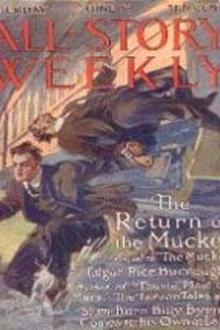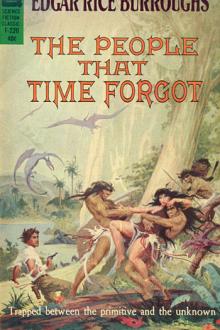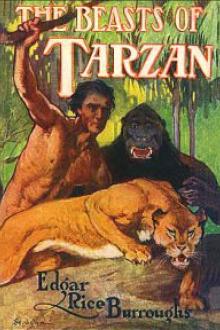The Return of the Mucker by Edgar Rice Burroughs (top inspirational books TXT) 📕

- Author: Edgar Rice Burroughs
- Performer: -
Book online «The Return of the Mucker by Edgar Rice Burroughs (top inspirational books TXT) 📕». Author Edgar Rice Burroughs
Bridge awoke about the same time, and turned lazily over, raising himself upon an elbow. He grinned at Billy.
“Good morning,” he said, and then:
Says I, “Then let’s be on the float. You certainly have got my goat; You make me hungry in my throat for seeing things that’s new. Out there somewhere we’ll ride the range a-looking for the new and strange; My feet are tired and need a change. Come on! It’s up to you!”
“Come on, then,” agreed Billy, coming to his feet.
As he rose there came, faintly, but distinct, the unmistakable scream of a frightened woman. From the direction of the farmhouse it came—from the farmhouse at which Billy had purchased their breakfast.
Without waiting for a repetition of the cry Billy wheeled and broke into a rapid run in the direction of the little cluster of buildings. Bridge leaped to his feet and followed him, dropping behind though, for he had not had the road work that Billy recently had been through in his training for the battle in which he had defeated the “white hope” that time in New York when Professor Cassidy had wagered his entire pile upon him, nor in vain.
Dink searched about the summer kitchen for an ax or hatchet; but failing to find either rummaged through a table drawer until he came upon a large carving knife. This would do the job nicely. He thumbed the edge as he carried it back into the parlor to Crumb.
The poor woman, lying upon the floor, was quite conscious. Her eyes were wide and rolling in horror. She struggled with her bonds, and tried to force the gag from her mouth with her tongue; but her every effort was useless. She had heard every word that had passed between the two men. She knew that they would carry out the plan they had formulated and that there was no chance that they would be interrupted in their gruesome work, for her husband had driven over to a farm beyond Holliday, leaving before sunrise, and there was little prospect that he would return before milking time in the evening. The detectives from Kansas City could not possibly reach the farm until far too late to save her.
She saw Dink return from the summer kitchen with the long knife. She recalled the day she had bought that knife in town, and the various uses to which she had put it. That very morning she had sliced some bacon with it. How distinctly such little things recurred to her at this frightful moment. And now the hideous creature standing beside her was going to use it to cut her throat.
She saw Crumb take the knife and feel of the blade, running his thumb along it. She saw him stoop, his eyes turned down upon hers. He grasped her chin and forced it upward and back, the better to expose her throat.
Oh, why could she not faint? Why must she suffer all these hideous preliminaries? Why could she not even close her eyes?
Crumb raised the knife and held the blade close above her bared neck. A shudder ran through her, and then the door crashed open and a man sprang into the room. It was Billy Byrne. Through the window he had seen what was passing in the interior.
His hand fell upon Crumb’s collar and jerked him backward from his prey. Dink seized the shotgun and turned it upon the intruder; but he was too close. Billy grasped the barrel of the weapon and threw the muzzle up toward the ceiling as the tramp pulled the trigger. Then he wrenched it from the man’s hands, swung it once above his head and crashed the stock down upon Dink’s skull.
Dink went down and out for the count—for several counts, in fact. Crumb stumbled to his feet and made a break for the door. In the doorway he ran full into Bridge, winded, but ready. The latter realizing that the matted one was attempting to escape, seized a handful of his tangled beard, and, as he had done upon another occasion, held the tramp’s head in rigid position while he planted a series of blows in the fellow’s face—blows that left Crumb as completely out of battle as was his mildewed comrade.
“Watch ‘em,” said Billy, handing Bridge the shotgun. Then he turned his attention to the woman. With the carving knife that was to have ended her life he cut her bonds. Removing the gag from her mouth he lifted her in his strong arms and carried her to the little horsehair sofa that stood in one corner of the parlor, laying her upon it very gently.
He was thinking of “Maw” Watson. This woman resembled her just a little—particularly in her comfortable, motherly expansiveness, and she had had a kind word and a cheery goodbye for him that morning as he had departed.
The woman lay upon the sofa, breathing hard, and moaning just a little. The shock had been almost too much even for her stolid nerves. Presently she turned her eyes toward Billy.
“You are a good boy,” she said, “and you come just in the nick o’ time. They got all my money. It’s in their clothes,” and then a look of terror overspread her face. For the moment she had forgotten what she had heard about this man—that he was an escaped convict—a convicted murderer. Was she any better off now that she had let him know about the money than she was with the others after they discovered it?
At her words Bridge kneeled and searched the two tramps. He counted the bills as he removed them from their pockets.
“Eleven hundred?” he asked, and handed the money to Billy.
“Eleven hundred, yes,” breathed the woman, faintly, her eyes horror-filled and fearful as she gazed upon Billy’s face. She didn’t care for the money any more—they could have it all if they would only let her live.
Billy turned toward her and held the rumpled green mass out.
“Here,” he said; “but that’s an awful lot o’ coin for a woman to have about de house—an’ her all alone. You ought not to a-done it.”
She took the money in trembling fingers. It seemed incredible that the man was returning it to her.
“But I knew it,” she said finally.
“Knew what?” asked Billy.
“I knew you was a good boy. They said you was a murderer.”
Billy’s brows contracted, and an expression of pain crossed his face.
“How did they come to say that?” he asked.
“I heard them telephonin’ to Kansas City to the police,” she replied, and then she sat bolt upright. “The detectives are on their way here now,” she almost screamed, “and even if you ARE a murderer I don’t care. I won’t stand by and see ‘em get you after what you have done for me. I don’t believe you’re a murderer anyhow. You’re a good boy. My boy would be about as old and as big as you by now—if he lives. He ran away a long time ago—maybe you’ve met him. His name’s Eddie—Eddie Shorter. I ain’t heard from him fer years.
“No,” she went on, “I don’t believe what they said—you got too good a face; but if you are a murderer you get out now before they come an’ I’ll send ‘em on a wild-goose chase in the wrong direction.”
“But these,” said Billy. “We can’t leave these here.”
“Tie ‘em up and give me the shotgun,” she said. “I’ll bet they don’t come any more funny business on me.” She had regained both her composure and her nerve by this time.
Together Billy and Bridge trussed up the two tramps. An elephant couldn’t have forced the bonds they placed upon them. Then they carried them down cellar and when they had come up again Mrs. Shorter barred the cellar door.
“I reckon they won’t get out of there very fast,” she said. “And now you two boys run along. Got any money?” and without waiting for a reply she counted twenty-five dollars from the roll she had tucked in the front of her waist and handed them to Billy.
“Nothin’ doin’,” said he; “but t’anks just the same.”
“You got to take it,” she insisted. “Let me make believe I’m givin’ it to my boy, Eddie—please,” and the tears that came to her eyes proved far more effective than her generous words.
“Aw, all right,” said Billy. “I’ll take it an’ pass it along to Eddie if I ever meet him, eh?”
“Now please hurry,” she urged. “I don’t want you to be caught—even if you are a murderer. I wish you weren’t though.”
“I’m not,” said Billy; “but de law says I am an’ what de law says, goes.”
He turned toward the doorway with Bridge, calling a goodbye to the woman, but as he stepped out upon the veranda the dust of a fast-moving automobile appeared about a bend in the road a half-mile from the house.
“Too late,” he said, turning to Bridge. “Here they come!”
The woman brushed by them and peered up the road.
“Yes,” she said, “it must be them. Lordy! What’ll we do?”
“I’ll duck out the back way, that’s what I’ll do,” said Billy.
“It wouldn’t do a mite of good,” said Mrs. Shorter, with a shake of her head. “They’ll telephone every farmer within twenty mile of here in every direction, an’ they’ll get you sure. Wait! I got a scheme. Come with me,” and she turned and bustled through the little parlor, out of a doorway into something that was half hall and half storeroom. There was a flight of stairs leading to the upper story, and she waddled up them as fast as her legs would carry her, motioning the two men to follow her.
In a rear room was a trapdoor in the ceiling.
“Drag that commode under this,” she told them. “Then climb into the attic, and close the trapdoor. They won’t never find you there.”
Billy pulled the ancient article of furniture beneath the opening, and in another moment the two men were in the stuffy atmosphere of the unventilated loft. Beneath them they heard Mrs. Shorter dragging the commode back to its accustomed place, and then the sound of her footsteps descending the stair.
Presently there came to them the rattling of a motor without, followed by the voices of men in the house. For an hour, half asphyxiated by the closeness of the attic, they waited, and then again they heard the sound of the running engine, diminishing as the machine drew away.
Shortly after, Mrs. Shorter’s voice rose to them from below:
“You ken come down now,” she said, “they’ve gone.”
When they had descended she led them to the kitchen.
“I got a bite to eat ready for you while they was here,” she explained. “When you’ve done you ken hide in the barn ‘til dark, an’ after that I’ll have my ol’ man take you ‘cross to Dodson, that’s a junction, an’ you’d aughter be able to git away easy enough from there. I told ‘em you started for Olathe—there’s where they’ve gone with the two tramps.
“My, but I did have a time of it! I ain’t much good at story-tellin’ but I reckon I told more stories this arternoon than I ever tole before in all my life. I told ‘em that they was two of you, an’ that the biggest one hed red hair, an’ the little one was all pock-marked. Then they said you prob’ly wasn’t the man at all, an’ my! how they did swear at them two tramps fer gettin’ ‘em way out here on a wild-goose chase; but they’re goin’ to look fer you jes’ the same in Olathe, only they won’t





Comments (0)